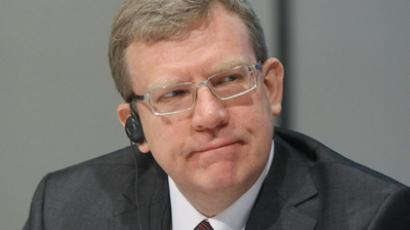Riding Russia’s natural energy advantage

With the 2011 surge in energy prices underlining the sector’s importance to the Russian economy Business RT spoke with Aton Chief strategist, Peter Westin about factors at play for the Russian energy sector, and it’s influence on the Russian economy.
RT: High oil prices have helped the Russian budget, but is the country too dependent on energy exports?PW:“Oil and gas accounts for about 60% of total exports.If you look at other natural resource oriented products you come to 85%.I don’t think you can call Russia too dependent, it is dependent, but I think, you know, people talk about the Dutch Disease which is a common phenomenon.I think one has to recognize that Russia has its own disease and it’s not sure, not certain, that it’s a disease already now.Because, at the moment you are generating enough revenues to cover your imports.But the other side is that the, classical example of the Dutch Disease is that your dependency on oil and gas or other natural resources, pushes up your real exchange rate and destroys your manufacturing industry.Well Russia hasn’t got a manufacturing base to destroy in the first place.Where you have a dependency, where you could be suffering is that you might have a hurdle for developing your manufacturing industry. But I don’t think we could say that we are too dependent.In fact Russia is exporting what it is supposed to be doing, according to the comparative advantages.It’s another question of how to diversify the economy, a totally different story.”RT:How much oil development does Russia potentially have?PW:“Well first of all it is already developed, you have production right now, it is more or less fully explored.You have untapped resources in Siberia and in the Arcticand in order to do that clearly the investment side isimportant.In other words channeling more money back into the development and exploration.From now, what they need is a better tax system, because you have a tax system right now, which is not helpful in terms of creating incentives for investment.And that has been a problem for quite some time – more or less since 2002.And we see that in the growth numbers basically, basically flat output growth in the crude segment going forward for at least the next 15 years, in our models .What they need? Well again a better tax system, and do they need help from foreigners? Well maybe in the geophysics and exploration side.When it comes to actually pulling it out of the ground I think the Russians have the capacity to do it themselves.But I think the most important thing is to have an incentive structure, to basically allow the companies to invest, and that is lacking at this point.”RT:Europe is very reliant on Russian energy, but how much is Russia doing to tap into the Asian market?PW:“Well they are doing as much as they can.If you look at China, China is the obvious country to look at. Unfortunately if you look at exports you see that exports to China have been growing along with general exports whereas imports from China is actually the fastest growing bilateral trade flow that we have, that Russia has, globally.The problem that you have with Asia is the transportation bottlenecks.Because the structure of exports to China, for example, is similar to total exports – oil and gas, metals which is dominating that as well.But you do have the fact that this has to be transported by railway, possibly by ship, and we don’t have a proper pipeline system to China when it comes to oil and gas.Therefore you are very dependent on what sort of transportation system you have, and that is creating, they are doing as much as they can, but obviously to develop and build your infrastructure to increase your exports is going to time consuming.But it is definitely something which is on the agenda, because we know that President Medvedev, and also Prime Minister Putin, have been making a lot of statements about the importance of Asia.So it is definitely on the agenda but right now their hands are tied because of transportation bottlenecks and that is requiring quite a lot of money.”RT:How open is the Russian energy sector to foreign investment and partners?PW:“If you look at the FDI that we’ve had since let’s say 94 when the Rosstat and the central Bank started to produce statistics, foreign investment into the energy segment, if you look at FDI, has actually been quite small, relative to total.It has been mainly dominated by into trade and catering, retail, food production, and lately automotive industry.The energy segment, for exactly this reason, the reason being that Russian companies did not see the benefit of Russian help and they wanted to protect it from foreign influence, has really been there. It opens up slightly later, so the energy sector has not been a major recipient.And, are they dependent on foreigners? I think you have to look at the different areas of the energy sector.I think in exploration, and that’s where you could see more cooperation with foreign companies, but when you are looking at actually bringing the oil out of the ground I think that Russia will continue to look for themselves, and not allow too much foreign competition in that segment.”RT:What does the Russian oil industry need? Funding or technical skills?PW:“It is probably more important on the technical skills rather than the funding basis.And if you look at other sectors in other countries you will see that the spillovers in terms of the technological spillovers, human capital, and distribution networks, is a vital key and a vital benefit of FDI.But for Russia it would be the same, that is why when it comes to FDI we think that it will be more involved in the geophysical part, in the exploration part, rather than bringing the oil out of the ground.The funding part I think they have very much set themselves, and they probably have enough resources to bring enough funding for projects. In order to also have the benefit of the funding, I think again you are looking at the tax system, because that always will come back to haunt Russia, when you look at the investment projects they are going to be facing.And I think also for the foreign investors, you don’t have PSA in Russia, Production Sharing Agreements, which you have in Kazakhstan and Turkmenistan, that has been extremely beneficial for the foreign partners.That is lacking in Russia, so I think that, for the foreign partners, being on the exploration side and the geophysical side of the equation is going to be more attractive than actually bringing the oil out of the ground, because you don’t have these PSAs.So I think that is more important than the funding issue.”RT:Europe continues to reform its energy sector, how does this impact energy companies in Russia?PW:“We know that Gazprom has said it will not sign the new energy charter with Europe.I do think that in the short term perspective, in the short term in this case I probably mean the next five years, maybe even ten years, Europe is very dependent on Russia so Gazprom not signing up to this I don’t think will influence it very much, because there are also bottlenecks for Europe and they have to try and diversify away from the Russian energy segment.Even on the LNG side, which has been very, there has been a lot of talk about LNG,and therefore a decrease in the Gazprom market share in Europe, we think that will reverse, because we don’t think that you will have a capacity to actually deliver enough LNG to basically circumvent Gazprom.So the energy charter sounds nice, but when push comes to shove I think a company like Gazprom is going to maintain or even increase its market share.”














